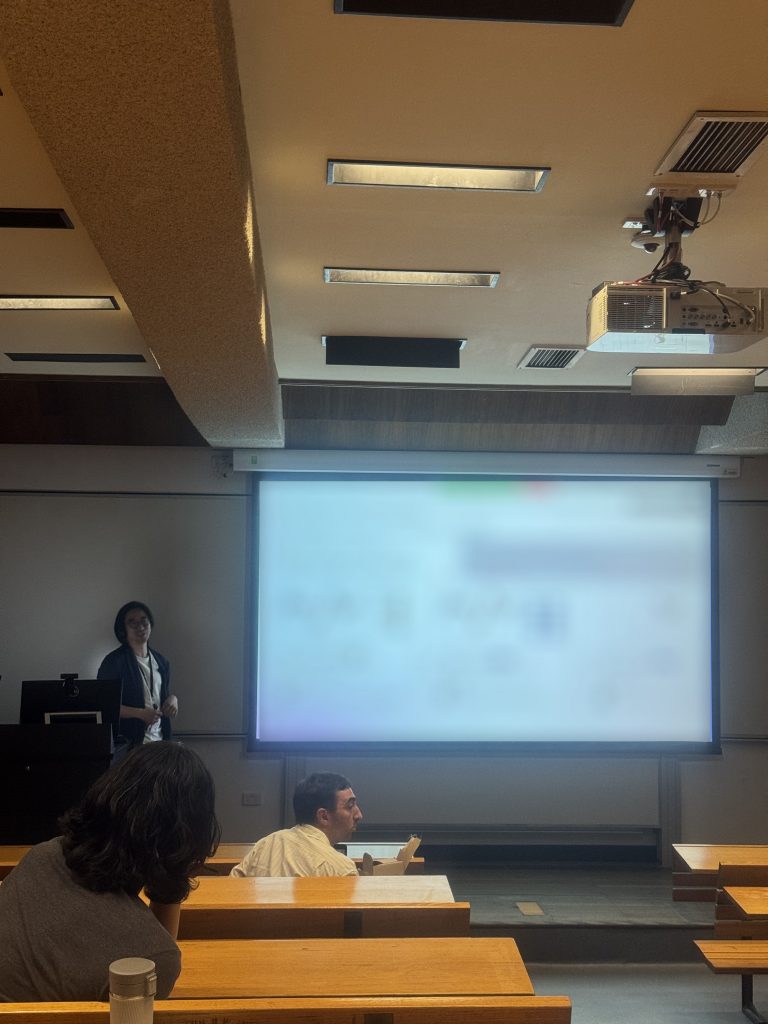2025.04.15
【WRH】 Assistant Professor Riki Kawase visited the University of Sydney in Australia
Assistant Professor Riki Kawase has returned from a six month stay in the University of Sydney supported by the WRH Faculty Research Abroad Program. This is a report on the activities and results of his stay.

Presentation at TransportLab Seminar
| Awardee | Riki Kawase |
| Destination Institution | The University of Sydney |
| City and Country | Sydney, Australia |
| Host Researcher | Dr. Mohsen Ramezani (Associate Professor) |
| Travel Period | 2024/9/12 – 2025/3/12 (182 days) |
| Project Title | Stochastic Control for Integrated Transport Systems with Shared Mobility and Public Transit in Urban Road Networks |
As urbanization increases traffic demand, it will be challenging to solve traffic congestion by relying on the development and distribution of public resources (e.g., roads). Shared mobilities (e.g., ridesharing, shared bikes) are attracting attention as a solution to traffic congestion by utilizing non-public supply resources. Unfortunately, the introduction of shared mobility is not an absolute solution, as the popularization of shared mobility can lead to an increase in supply (e.g., vehicles), which can cause heavy congestion in limited urban spaces. To overcome these challenges, it is a promising solution to integrate public transit, which is space-efficient but inflexible, with shared mobility, which is flexible but low space-efficiency. However, because the integrated transportation system involves matching passengers and drivers, as well as shared mobility and public transit, it can easily become unstable against system uncertainty. We conduct joint research with Dr. Ramezani, who has a background in control engineering and is deeply knowledgeable about urban-scale traffic management, to build a stochastic control model for urban-scale integrated transportation systems.
(1) Platform for dockless bike-sharing systems under demand uncertainty: dynamic pricing and parking recommendations
Dockless bike-sharing systems have emerged as a promising transportation mode that is low-carbon, environment-friendly, and sustainable. The nature of one-way usage in bike-sharing systems inherently poses the issue of demand-supply incongruence over time and space. The spatial flexibility of parking in dockless systems can accelerate the incongruence, resulting in a significant decrease in user satisfaction with bike-sharing services. We focus on dynamic pricing and parking recommendations to encourage users to ride bikes for better rebalancing, such as moving bikes from over-supplied to under-supplied areas. Unfortunately, the uncertainty in travel demand further accelerates the incongruence, emphasizing difficulties in designing dynamic pricing and parking recommendations. This study presents a joint optimization model of dynamic pricing and parking recommendations under demand uncertainty in a dockless bike-sharing system. We formulate this problem as a multi-stage stochastic convex programming problem, which can be solved using a multi-stage Benders decomposition, called stochastic dual dynamic programming (SDDP), with guaranteed convergence under mild assumptions. Our numerical experiments using a grid network illustrate that shared-bike rebalancing with dynamic pricing and parking recommendations can achieve Pareto efficiency and robustness. Future works combine a dynamic simulation of the bike-sharing system and the proposed optimization problem to develop a city-scale bike-sharing system platform.
(2) Shared autonomous vehicle operation and infrastructure design with on-demand and pre-booked requests
Shared autonomous vehicle (SAV) systems will emerge as an innovative solution to urban traffic congestion in the future. As SAVs will revolutionize transportation systems, we urgently need to explore the day-to-day operation and long-term design of SAV systems. This study presents optimization problems to jointly determine long-term network design and short-term routing and ridesharing matching in SAV systems with pre-booked and on-demand trip requests. This problem is formulated as a bi-objective multi-stage stochastic linear programming problem, whose linearity affords us the following computational and theoretical benefits:
-We can tackle the computational complexity due to multiple objectives and dynamic stochasticity through the weighted sum method and SDDP.
-We mathematically derive a useful property of the problem: the introduction of ridesharing and pre-booked options can weakly monotonically and simultaneously decrease the short-term operational cost (e.g., total travel time of travelers) and long-term strategic cost (e.g., infrastructure design costs).
Related links:
– World Research Hub (WRH) Program
– Riki Kawase (Science Tokyo STAR Search)

